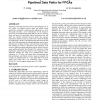Free Online Productivity Tools
i2Speak
i2Symbol
i2OCR
iTex2Img
iWeb2Print
iWeb2Shot
i2Type
iPdf2Split
iPdf2Merge
i2Bopomofo
i2Arabic
i2Style
i2Image
i2PDF
iLatex2Rtf
Sci2ools
101
click to vote
FPGA
1999
ACM
1999
ACM
Reduction of Latency and Resource Usage in Bit-Level Pipelined Data Paths for FPGAs
Pipelining of data path structures increases the throughput rate at the expense of enlarged resource usage and latency unless architectures optimized towards specific applications are used. This paper describes a novel methodology for the design of generic bit-level pipelined data paths that have the low resource usage and latency of specifically tailored architectures but still allow the flexible trade-off between speed and resource requirements inherent in generic circuits. This is achieved through the elimination of all skew and alignment flip-flops from the data path whilst still maintaining the original pipelining scheme, hence allowing more compact structures with decreased circuit delays. The resulting low latency is beneficial in the realization of all recursive signal-processing applications and the reduced resource usage enables particularly the efficient FPGA realization of high performance signal processing functions. The design process is illustrated through the high leve...
Data Path | FPGA | FPGA 1999 | FPGA Realization | Resource Usage |
| Added | 04 Aug 2010 |
| Updated | 04 Aug 2010 |
| Type | Conference |
| Year | 1999 |
| Where | FPGA |
| Authors | Peter Kollig, Bashir M. Al-Hashimi |
Comments (0)

